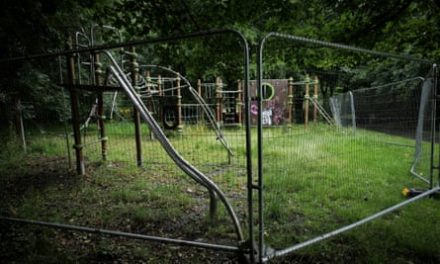Dame Alison Rose, the chief executive of NatWest Group, has stood down after a row over the closure of Nigel Farage’s bank account with the private bank Coutts, which NatWest owns.
Rose has resigned from the banking group after Farage complained to the BBC about a report that claimed his accounts with Coutts were closed for commercial reasons. The broadcaster has since apologised and amended its story.
In a statement released on Wednesday morning, the NatWest Group chairman, Sir Howard Davies, said: “The board and Alison Rose have agreed, by mutual consent, that she will step down as CEO of the NatWest Group. It is a sad moment.
“She has dedicated all her working life so far to NatWest and will leave many colleagues who respect and admire her.”
In a statement of her own, Rose thanked her colleagues “for all that they have done”, adding: “I remain immensely proud of the progress the bank has made in supporting people, families and business across the UK, and building the foundations for sustainable growth.”
The announcement of her resignation came a few hours after an emergency board meeting was called on Tuesday night to determine her future.
NatWest’s board of directors also announced that Paul Thwaite, the chief executive for commercial and institutional business, would take over Rose’s responsibilities for an initial period of 12 months, pending regulatory approval. The board said in a statement that appointment of a permanent successor would take place “in due course”.
Rose’s resignation follows an admission that she was the source of a controversial BBC story about Farage’s bank accounts, and for which she issued a grovelling apology.
Commercial considerations – falling below a wealth threshold – were one reason why his accounts could be closed, said a dossier obtained by Farage using a subject access request.
However, the documents also showed that media coverage of his political views was weighed up while discussing whether to retain him as a client.
Farage, the former leader of the UK Independence party, had claimed that his bank account was closed on the basis of “blatant corporate prejudice” or because of rules about financial services for being a so-called politically exposed person: someone with political connections that could make them more at risk of receiving corrupt or illegal payments.
He said “I can’t get a bank account” in a video about the account closures at Coutts on 29 June. However, it is unclear when he was offered an alternative of accounts with its sister lender, the high street bank NatWest.
In a letter of apology to Farage sent last week, Rose said the bank would “reiterate” its offer for “alternative banking arrangements” at NatWest, but that it was sorry for “deeply inappropriate comments” about the political campaigner.
Davies said earlier on Tuesday that the board was giving its full backing to its 53-year-old chief executive, who has spent her career at the lender, and retained the board’s “full confidence”.
Rose said in her own statement on Tuesday, prior to resigning, that she made a “serious error of judgment” during a conversation with Simon Jack, the BBC News business editor, in which she confirmed that the bank had taken a “commercial decision” in shutting Farage’s Coutts account and offering him a NatWest account. It was subsequently reported by the BBC that Farage had been expelled from the bank because its customers are required to hold £3m in savings, or borrow or invest £1m.
after newsletter promotion
Rose said that in speaking to the reporter, “I repeated what Mr Farage had already stated, that the bank saw this as a commercial decision. I would like to emphasise that in responding to Mr Jack’s questions I did not reveal any personal financial information about Mr Farage.”
She added: “Put simply, I was wrong to respond to any question raised by the BBC about this case. I want to extend my sincere apologies to Mr Farage for the personal hurt this has caused him and I have written to him today.”
Farage said prior to Rose’s resignation: “Alison Rose has now admitted that she is the source. She broke client confidentiality, and is unfit to be CEO of NatWest Group. Meanwhile, Coutts’ CEO, Peter Flavel, must take the ultimate responsibility for debanking me based on my political views. Sir Howard Davies is responsible for overall governance. He has clearly failed in this task, least of all by endorsing their conduct. In my view they should all go.”
Rose became the bank’s first female chief executive in late 2019, when it was known as Royal Bank of Scotland Group. The bank, which was bailed out by taxpayers during the 2008 financial crisis, is still 38.6% owned by the UK government.
Davies said the board considered the overall handling of Farage’s accounts had been “unsatisfactory” and led to “serious consequences for the bank”. He confirmed that the board would launch an independent review that would look into the closure and lessons that could be learned.
The Financial Conduct Authority (FCA) said it welcomed NatWest’s independent review, which it had pressed for when it contacted the group in the wake of Farage’s allegations. “It is vital that the review is well resourced and those conducting it have access to all the necessary information and people in order to investigate what happened swiftly and fully,” said Sheldon Mills, the FCA’s consumer and competitions director.
“On the basis of the review and any steps taken by other authorities, such as the Financial Ombudsman Service or information commissioner, on relevant complaints, we will decide if any further action is necessary.”
Join the exciting world of cryptocurrency trading with ByBit! As a new trader, you can benefit from a $10 bonus and up to $1,000 in rewards when you register using our referral link. With ByBit’s user-friendly platform and advanced trading tools, you can take advantage of cryptocurrency volatility and potentially make significant profits. Don’t miss this opportunity – sign up now and start trading!







Recent Comments